Transcript of Argument by Jody Williams
To the Human Security Debate hosted by UNIDIR
Council Chamber, Palais des Nations
Geneva, Switzerland
23 November 2005
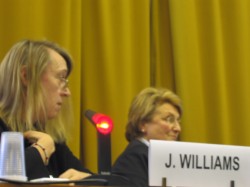 Background:
Background:
To initiate a series of events commemorating the occasion of its 25th anniversary, the United Nations Institute for Disarmament Research (UNIDIR) hosted a debate on the motion: “Human security should be the fundamental basis for multilateral disarmament and arms control negotiations.†Many diplomats participating in meetings of the Convention on Conventional Weapons (CCW) and Geneva-based disarmament ambassadors attended as did representatives of NGOs such as the International Campaign to Ban Landmines (ICBL). The debate was held in the Council room where the Conference on Disarmament regularly meets, and where it has been unable to agree on an agenda since 1997. The CD takes its decisions by consensus, as does the CCW, which after four years of discussion has failed to reach any agreement to negotiate greater restrictions on antivehicle mines.
Helga Hernes, the former State Secretary of Foreign Affairs of Norway joined Jody in arguing in favour of the motion, while two academics spoke in opposition: Brahma Chellaney, Professor of Strategic Studies at the Indian Centre for Policy Research, and Gerald Steinberg, Director of the Conflict Resolution Programme at Bar Ilan University in Israel. Hernes spoke first, followed by Chellaney, who ended his argument with a provocative comment, noting that in the debate it was women defending human security and men advocating for national security. He intimated that it was somehow indicative of a “soft-headed†view of how to meet real security needs in a violent world.
All presentations are available from the UNIDIR website at www.unidir.org
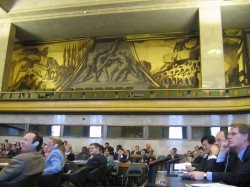 Jody Williams:
Jody Williams:
I guess if being practical means accepting a male-centric point of view about security in the world, I’d much prefer being utopian. If being practical means that I have to be in a room where 99 percent of the time the people dealing with the security debate are men and I’m the only woman in the room wondering about my security that you are all deciding on as you declare war and I try to keep my family alive, label me utopian. If the world of violence and terror we’re living in is the world you propose for me and I’m supposed to accept that point of view, label me utopian. I don’t want your world. I don’t want a world in which men decide that the biggest ballistic missile-and you know what I mean-is what is going to protect me from terrorism. Your biggest ballistic missiles did not save New York.
I regret that I’ve not had time or energy to prepare an academic debate – as other speakers have done. I was in Algeria working on the utopian dream of a world free of landmines so I’m just going to talk of my own experience because that is what we were asked to do as well. I prepared no debate points. I am not going to rebut you because I grew up in Fox America where you’re not really supposed to talk about how you feel. You’re just supposed to scream at each other. I choose not to scream. I’ll talk about my experience. You can think about it as you wish. You can stay in your little box of diplomacy and decide that you can only respond the way you’re always supposed to respond. But this is supposed to be just a discussion about human beings and security and how we see our future.
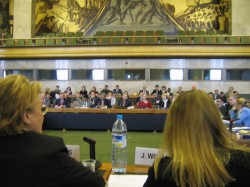 I see my future as doomed if we continue to think the way we’ve been thinking. I see it as doomed. I may be called a utopian, but I’m actually a hell of a pessimist. I just keep trying to make things a little bit different, trying to make diplomats understand that changing the world means taking risks. It means not thinking that if you debate for four years in a room and change a comma in a treaty that you’ve done something grand and profound.
I see my future as doomed if we continue to think the way we’ve been thinking. I see it as doomed. I may be called a utopian, but I’m actually a hell of a pessimist. I just keep trying to make things a little bit different, trying to make diplomats understand that changing the world means taking risks. It means not thinking that if you debate for four years in a room and change a comma in a treaty that you’ve done something grand and profound.
I’m going to talk personally about terror and security, from my perspective. I remember the Cuban missile crisis very vividly. I was twelve years old. I hid in terror under the desk in my school, as we were trained to do, wondering if the two great power blocks were going to kill me over some absurd struggle for power. They didn’t care one iota about my personal security. It wasn’t about me as a human being; it was about which block of countries could have the most power. That is not my security; they didn’t care in the least. They cared about which economic system could advance more in the world and control the world. If that is thinking about my security, I wish they had thought differently.
I noted that the millions marching in the streets in the 1970s calling for nuclear disarmament were not heeded by their governments. I still wonder what is the purpose of government if not to heed what its citizens want. I still don’t get it. Once somebody is in government they suddenly seem to think they’re transformed and they have superior knowledge of what their people want. I actually believe that the government works for me and that they’re supposed to do what I want. Not suddenly they are in charge and I’m some ignorant person who is not allowed to have a voice until I vote the next time for whichever candidate of the two of parties always in power in my country is least harmful. Not my view of security in the world.
I would contend that with the end of the Cold War there were new opportunities. I remember vividly of course some utopians-and believe me I am not utopian nor am I a pacifist-some actually had the absurd notion that suddenly the world would become a better place. Suddenly standing armies would be reduced in size. Suddenly we would have less nuclear weapons and all of that extra money would go to making the world a better place.
 Being from the United States, I had a different point of view — that in the now unipolar world my sometimes benevolent country would in fact try to take over the world, not literally, but by virtue of having the most powerful military and ensuring nobody could catch up militarily. Would ensure that no country could catch up technologically. Would ensure its economic dominance. If that’s increasing human security I don’t want it.
Being from the United States, I had a different point of view — that in the now unipolar world my sometimes benevolent country would in fact try to take over the world, not literally, but by virtue of having the most powerful military and ensuring nobody could catch up militarily. Would ensure that no country could catch up technologically. Would ensure its economic dominance. If that’s increasing human security I don’t want it.
Some of us actually hoped however that in that new moment there might be a different way of thinking about security. There might be a different kind of leadership. Out of that environment came the landmine movement. It was actually a movement that managed to seize the public conscience. We were actually able to get governments to respond to what people wanted. We were actually able to get them to step-no offense to the UN, I’m fond of the UN-to step out of the normal diplomatic framework and not be held hostage to what I believe personally is the tyranny of consensus. Where any one nation, no matter how powerful or how small, can stop change in the world. I call that dictatorship. What is so great about that? That any one nation can tell me that I can’t change the world? Not the security that I want.
Out of that experience in the landmine campaign, where small and middle powers actually dared to stand up in the unipolar world and listen to civil society, we got a Mine Ban Treaty. I’m not going to debate whether or not it’s an important treaty because the US, China, Russia aren’t on board. If you want to talk about that come to the Landmine Monitor briefing tomorrow afternoon. We’ve been debating it for years. Some 147 nations are part of this treaty including most of those where people are killed everyday by landmines. I think that’s the real measure of success in our treaty.
It was also that experience — in which civil society actually had a place in the debate –that gave new energy to considering that maybe we can actually think about security in a different way. I think one of the ways that those who are offended by the possibility of real change in thinking about security try to emasculate the discussion is by saying it’s either state-based security or it’s this wimpy human security thing – a concept that only girls can like – as stated by the previous speaker. But I don’t see the two as mutually exclusive. I see them as complementary.
I don’t think that human security is about prioritizing the needs of the individual over the needs of the state. At the same time, I don’t know what the purpose of the state is if it isn’t about dealing with my needs. I think human security and national security are complementary. When one of the speakers talked about the great states being able to have human security within their borders because they have those big missiles protecting them, I don’t think that’s the human security I’m talking about. It is not about human security only for individuals within one’s own borders. I think about human security resting on global security and global justice. I know it’s a horribly girley thing to think about things that way.
When September 11th happened in my country-and I’m no fan of the current government and nobody doubts that — however I love my nation. I love my people. But let’s think about it. When September 11th happened in the United States we were the most powerful nation in world. A great democracy of great rights and freedoms. We have great human rights in our nation. (Unless you’re on death row. Unless you’re a woman. Unless you’re in New Orleans and you get whacked by the hurricane and you’re black…) We had the biggest missiles in the world – probably the most missiles in the world. Our security was assured. But it’s not the security I think we need in our nation. Despite all of our great advances, human rights, democracy – missiles to protect our national security — we had nineteen men come into our country and in four places whack the United States of America.
What is our response? How many billions of dollars to make bigger missiles? To create Star Wars — and I still want to know how that’s that going to defend me from the next plane that flies into a building! Excuse my ignorance. I know girls don’t really understand security, but I want to know how I’m made more secure by 44 billion dollars going to the intelligence agencies of my country now. What has it done for me so far?
When 9/11 happened we were not allowed to ask the question “why?†And yet rest assured that the people in the Pentagon were asking why. I mean — nineteen guys fly planes into your buildings. Of course you ask, “Why did these guys do it?†But if we tried to begin a rational debate about what led those men to fly into our buildings, we were labeled traitors. That made me even more determined that I would exercise my right to talk about human security. Don’t just give me a bigger missile! I want to know why the hell those people hate me so much that they want to fly a plane into my building!
Human security doesn’t mean that the richest, most powerful nations should work for even bigger weapons so that we can remain in fortress America, or the fortress of The North, or the fortress of The West and be more “secure.†Think about it — the people living in poverty now have access to television, the Internet, etcetera. They can see clearly how we live. They can see that twenty percent of the people of world control eighty percent resources of the world. If I were them, I’d get a little mad myself. If I were the guy living in the country watching you guys take everything I might consider flying a plane into your building too.
I do wonder what happened to enlightened self-interest? It doesn’t mean you actually have to like those “creepy little people.†I don’t like everybody for God’s sake. I didn’t become Mother Theresa with the Nobel Peace Prize. I “hate†a lot of people and those of you who’ve worked with me know it, but I have the good sense to attempt to make you think I think you’re OK so that you don’t want to kill me.
The great FDR in the United States, our president in the Depression and World War Two, is held up as the great hero for saving our poor. A lot of people actually think he was just a smart rich guy who understood that the way he was going to save the country for the rich was by giving those poor little “working slobs†enough money so they could mortgage their lives and work forever and pay the bank – give them “hope†for their future. It worked. Enlightened self-interest.
I don’t get how the rich nations of the world don’t understand if they make the “poor little slob of the world†have a little bit of hope for the future maybe he won’t want to strap on a bomb on himself and blow you up because you’ve got all the stuff and he doesn’t. That’s human security. That is human security in my book. That is not utopian in the least. It’s not pretty, is it? I want you to care about your future so that you don’t want to kill me. If that’s a girley point of view, call me a girl because I am. I do not want to change and I do not want to accept your point of view that I need bigger missiles to make myself more safe.
I think that part of the issue is that formal diplomacy is still terrified at having “girl like me†in the room telling you that you’re way of doing things is “dumb.†Diplomats don’t like people like me saying there’s something wrong with what you guys are doing. Asking why you don’t seem to care — this really gets you. This is when I’m really accused of being a “girl†— and I don’t even have kids. Don’t delude yourself that I want to protect my children. I chose not to have them. I’m not even maternal in the least.
But I do wonder about most of you who do have children. When you go home from your government job at night and you look at your children. Don’t you step outside of I’m ambassador-this or diplomat-that and look at your children in today’s world and think: What am I doing? How do you go home at night and think if you build a bigger ballistic missile you’re making your children more secure or your children’s children or your great-grandchildren. How do you divide the world in your head? My children are good. They live in my country. They’re OK. Your children, however, are bad, evil, worthy of death because they look different, they talk different. It’s OK to shoot them. It’s OK to kill them to protect my state, my children. That’s security?
I was in Algeria yesterday talking to the president, the minister of defense, etcetera. They all wonder about security in the world. They all wonder: Why you don’t care about my people? You are willing to see my people die. We’re willing to fight you back. Just like when you tell me if I’m a girl and I want to be practical I have to accept your frame of view of the world and how it should be. In Algeria they said to me: Sitting in my world, I look at you and just don’t see the world the way you see it. I see it from my own experience.
If I want you to at least talk me civilly, I have to accept that your experience is different. That’s human security. It doesn’t necessarily mean I don’t have to have a gun to shoot the guy who tries to breaks into my house. It does mean that I have to accept that the other guy has a point of view. I may not like it. But if I want to be secure in the world, I have to accept that. Or I perhaps can just nuke ‘em all. I mean given the way things are going in the CD and the CCW? Impressive, guys. What are you doing?
What are you doing? What are you doing?
You’re not making my world better. There are six billion of us and I bet if you took a global vote, most of us would throw you out of office and we would do it differently. I know I would throw most of the men out. Not all of them. Some of you can actually think like a girl. We need more women where you all are. We need more women in the negotiating process. We need more women in the bureaucracy of the UN. What was that resolution that was passed that was supposed to make ten percent of the people in the UN bureaucracy women? How far are you now? Five percent? How much of the world are we? Over fifty percent? We’re too wimpy to understand so we couldn’t possibly have these powerful jobs?
I am no wimp. But in my world, give me some aspect of human security; maybe just a little but of understanding. Have the courage to ask yourself if bigger missiles have made us safe. It hasn’t worked yet, has it? Not in my book. Sure, I can nuke you with my bigger missile, but then what? Then what?
As it was pointed out to me in Algeria, Rome was a fantastic empire for how many centuries? Rome stretched from Italy all the way to Algeria. And what happened to it? People get mad when you keep them down — and back then they didn’t even have Internet to communicate! They couldn’t get on a plane and fly it into a building. But they did get mad and they took the empire down.
As China has pointed out on more than one occasion — and I recall one of my favorite stories about Henry Kissinger—I won’t even go into how I feel about Henry–lecturing the Chinese – probably about our superior system, and in the course of that, asking them how they felt about the French revolution. The Chinese said, “Who knows? It’s a little bit early to tell. It’s only been a couple of hundred years. We’ve been around several thousand.“
I really think that we need a different concept of security. It doesn’t mean you can’t have your big missile, but it also means that you have to meet the basic needs of the majority of the planet. When I’ve said that before, people said that I’m a socialist – trying to take from the rich and give to the poor. I’m not a democrat, I’m not a republican, I’m not a communist, I’m not anything. I’m a person who thinks. Some of you don’t even seem to want to try.
Our world is different. In our globalized world, if we don’t begin to do things differently we’re doomed. To keep thinking the way we thought in the Cold War is absurd. To keep thinking that any one state can dominate forever is absurd.
I know you’ll probably all vote for bigger missiles – national security over human security. You’re all men in the room I realize it’s a more comfortable vote. Scary to think out of the box. Scary to let girls into the debate. Scary to let NGOs into the room. But the world is changing and we’re out of our little box and it’s impossible to put us all back in. You may try. Mr. Bolton, for example, certainly tries to keep us out of the room. He hates NGOs — but he hates everybody, unless you’re American and inside the Beltway. But we’re not going away. And we’re going to insist on a different security framework. Sorry, but let more girls in the room, and we’ll continue to shake you up.
To see who “won†this debate, go to www.unidir.org
Thanks to UNIDIR for allowing us to reprint this transcript
# # #
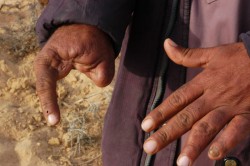

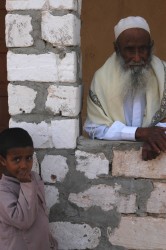

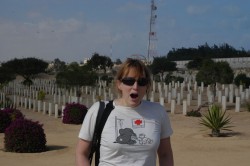
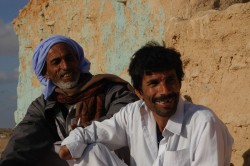
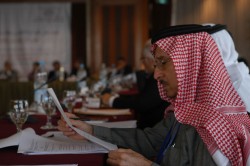

 Background:
Background: Jody Williams:
Jody Williams: I see my future as doomed if we continue to think the way we’ve been thinking. I see it as doomed. I may be called a utopian, but I’m actually a hell of a pessimist. I just keep trying to make things a little bit different, trying to make diplomats understand that changing the world means taking risks. It means not thinking that if you debate for four years in a room and change a comma in a treaty that you’ve done something grand and profound.
I see my future as doomed if we continue to think the way we’ve been thinking. I see it as doomed. I may be called a utopian, but I’m actually a hell of a pessimist. I just keep trying to make things a little bit different, trying to make diplomats understand that changing the world means taking risks. It means not thinking that if you debate for four years in a room and change a comma in a treaty that you’ve done something grand and profound. Being from the United States, I had a different point of view — that in the now unipolar world my sometimes benevolent country would in fact try to take over the world, not literally, but by virtue of having the most powerful military and ensuring nobody could catch up militarily. Would ensure that no country could catch up technologically. Would ensure its economic dominance. If that’s increasing human security I don’t want it.
Being from the United States, I had a different point of view — that in the now unipolar world my sometimes benevolent country would in fact try to take over the world, not literally, but by virtue of having the most powerful military and ensuring nobody could catch up militarily. Would ensure that no country could catch up technologically. Would ensure its economic dominance. If that’s increasing human security I don’t want it.


